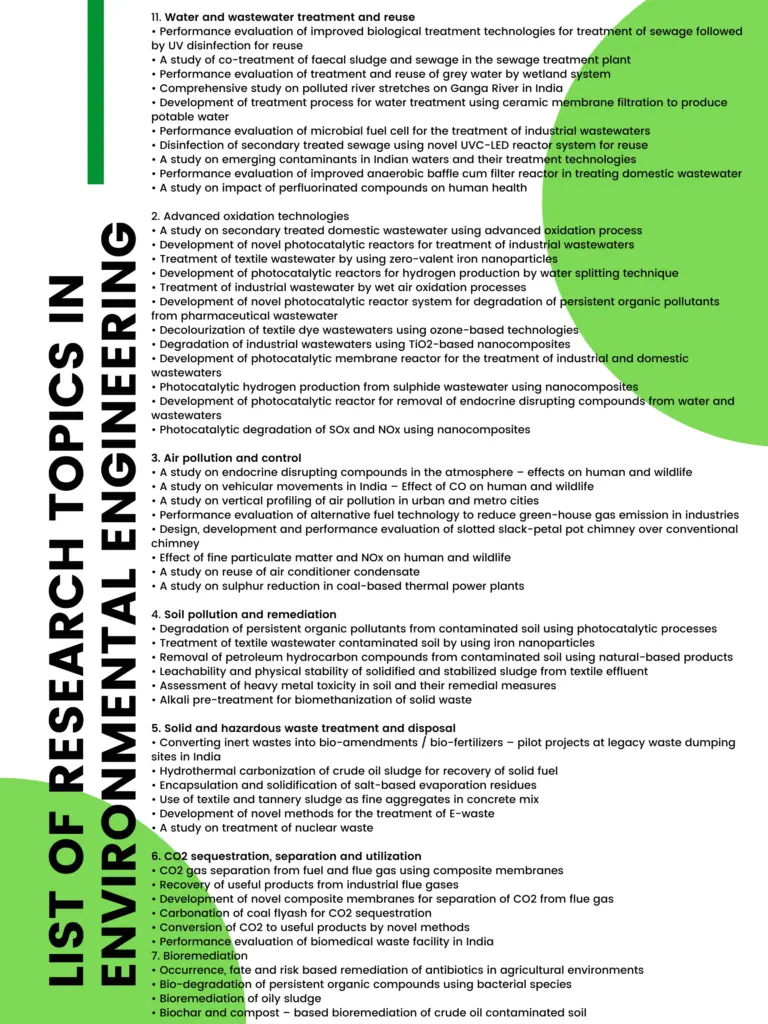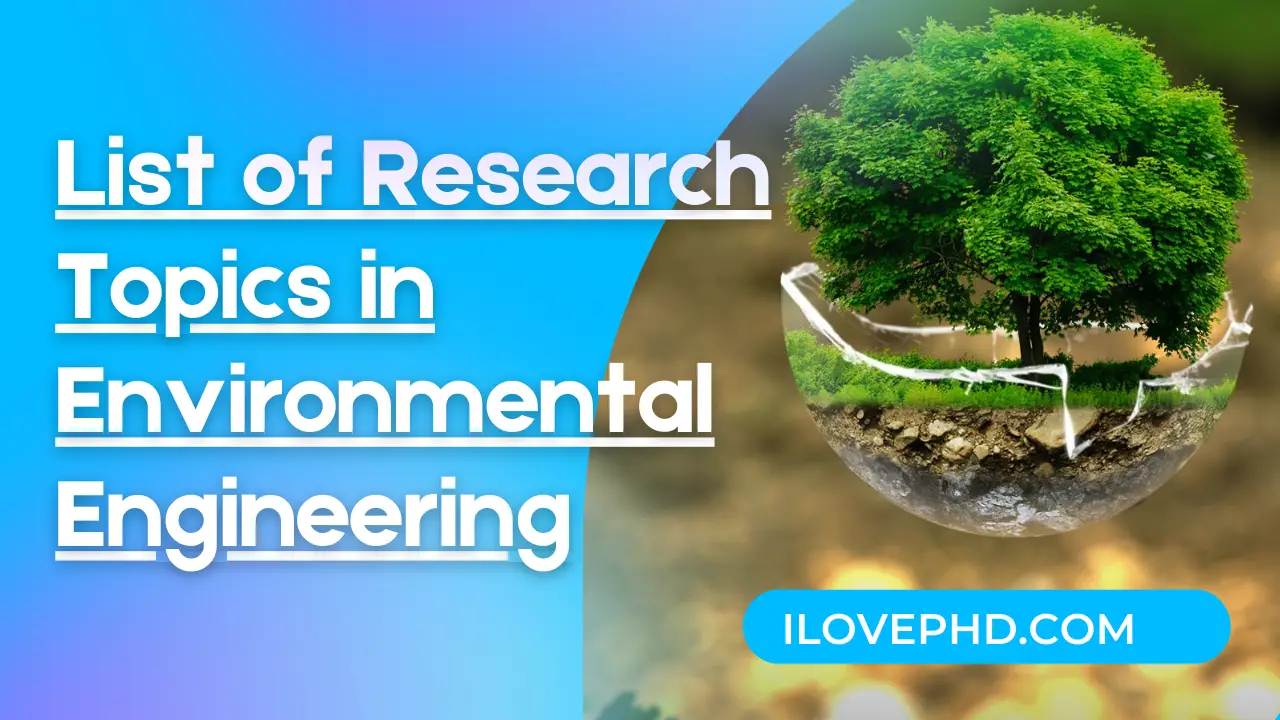Environmental Engineering is a discipline of engineering that deals with the prevention & control of water, air, and soil pollution. In this article list of Research Topics in Environmental Engineering is listed.
The active research areas in the field of environmental engineering are water and wastewater treatment and disposal; environmental chemistry; environmental microbiology; environmental impact assessment; membrane technology; advanced oxidation process; catalysis; air pollution, prevention, and control; solid and hazardous waste management.
List of Research Topics in Environmental Engineering
Water and wastewater treatment and reuse
- Performance evaluation of improved biological treatment technologies for the treatment of sewage followed by UV disinfection for reuse
- A study of co-treatment of fecal sludge and sewage in the sewage treatment plant
- Performance evaluation of treatment and reuse of greywater by wetland system
- A comprehensive study on polluted river stretches on the Ganga River in India
- Development of treatment process for water treatment using ceramic membrane filtration to produce potable water
- Performance evaluation of microbial fuel cells for the treatment of industrial wastewaters
- Disinfection of secondary treated sewage using a novel UVC-LED reactor system for reuse
- A study on emerging contaminants in Indian waters and their treatment technologies
- Performance evaluation of improved anaerobic baffle filter reactor in treating domestic wastewater
- A study on the impact of perfluorinated compounds on human health
Advanced oxidation technologies
- A study on secondary treated domestic wastewater using an advanced oxidation process
- Development of novel photocatalytic reactors for treatment of industrial wastewaters
- Treatment of textile wastewater by using zero-valent iron nanoparticles
- Development of photocatalytic reactors for hydrogen production by water splitting technique
- Treatment of industrial wastewater by wet air oxidation processes
- Development of a novel photocatalytic reactor system for degradation of persistent organic pollutants from pharmaceutical wastewater
- Decolourization of textile dye wastewaters using ozone-based technologies
- Degradation of industrial wastewaters using TiO2-based nanocomposites
- Development of photocatalytic membrane reactor for the treatment of industrial and domestic wastewaters
- Photocatalytic hydrogen production from sulfide wastewater using nanocomposites
- Development of photocatalytic reactor for removal of endocrine-disrupting compounds from water and wastewaters
- Photocatalytic degradation of SOx and NOx using nanocomposites
Air pollution and control
- A study on endocrine-disrupting compounds in the atmosphere – effects on human and wildlife
- A study on vehicular movements in India – Effect of CO on human and wildlife
- A study on vertical profiling of air pollution in urban and metro cities
- Performance evaluation of alternative fuel technology to reduce greenhouse gas emissions in industries
- Design, development, and performance evaluation of slotted slack-petal pot chimney over a conventional chimney
- Effect of fine particulate matter and NOx on human and wildlife
- A study on the reuse of air conditioner condensate
- A study on sulfur reduction in coal-based thermal power plants
Soil pollution and remediation
- Degradation of persistent organic pollutants from contaminated soil using photocatalytic processes
- Treatment of textile wastewater contaminated soil by using iron nanoparticles
- Removal of petroleum hydrocarbon compounds from contaminated soil using natural-based products
- Leachability and physical stability of solidified and stabilized sludge from textile effluent
- Assessment of heavy metal toxicity in soil and their remedial measures
- Alkali pre-treatment for bio mechanization of solid waste
Solid and hazardous waste treatment and disposal
- Converting inert wastes into bio-amendments / bio-fertilizers – pilot projects at legacy waste dumping sites in India
- Hydrothermal carbonization of crude oil sludge for recovery of solid fuel
- Encapsulation and solidification of salt-based evaporation residues
- Use of textile and tannery sludge as fine aggregates in concrete mix
- Development of novel methods for the treatment of E-waste
- A study on the treatment of nuclear waste
CO2 sequestration, separation, and utilization
- CO2 gas separation from fuel and flue gas using composite membranes
- Recovery of useful products from industrial flue gases
- Development of novel composite membranes for separation of CO2 from flue gas
- Carbonation of coal fly ash for CO2 sequestration
- Conversion of CO2 to useful products by novel methods
- Performance evaluation of biomedical waste facility in India
Bioremediation
- Occurrence, fate, and risk-based remediation of antibiotics in agricultural environments
- Bio-degradation of persistent organic compounds using bacterial species
- Bioremediation of oily sludge
- Biochar and compost-based bioremediation of crude oil-contaminated soil
10 Groundbreaking Environmental Engineering Research Topics That Will Shape Our Future
1. Advanced Water Treatment Technologies
As clean water becomes increasingly scarce, researchers are developing breakthrough technologies to purify and conserve this precious resource. One exciting area of study is the use of nanotechnology in water treatment. Nanomaterials like graphene oxide show promise in removing contaminants more efficiently than traditional methods.
FAQ: How can nanotechnology improve water treatment? Answer: Nanomaterials have a larger surface area-to-volume ratio, allowing them to trap more contaminants. They can also be designed to target specific pollutants, making the treatment process more effective and energy-efficient.
2. Sustainable Urban Planning
With over half the world’s population living in cities, urban environmental engineering is more crucial than ever. Researchers are exploring ways to create “smart cities” that minimize environmental impact while maximizing quality of life.
Key focus areas include:
- Green infrastructure design
- Efficient public transportation systems
- Urban agriculture and vertical farming
3. Renewable Energy Integration
As we transition away from fossil fuels, environmental engineers are working on innovative ways to integrate renewable energy sources into our existing infrastructure. This includes developing more efficient solar panels, wind turbines, and energy storage systems.
Did you know? According to the International Energy Agency, renewable energy capacity is set to expand by 50% between 2019 and 2024, led by solar PV.
4. Microplastic Remediation
The pervasive problem of microplastics in our oceans and waterways has sparked intense research into remediation techniques. Environmental engineers are exploring biological solutions, such as plastic-eating bacteria, as well as physical methods like advanced filtration systems.
5. Carbon Capture and Storage (CCS)
As global temperatures continue to rise, CCS technology is becoming increasingly important. Researchers are working on improving the efficiency and scalability of carbon capture methods, as well as finding innovative ways to store or repurpose captured CO2.
FAQ: Is carbon capture really effective in combating climate change? Answer: While not a silver bullet, CCS can play a significant role in reducing greenhouse gas emissions when combined with other mitigation strategies. The technology is rapidly improving, making it more cost-effective and efficient.
6. Biodegradable Materials Engineering
The development of sustainable, biodegradable materials is crucial for reducing waste and pollution. Environmental engineers are creating new materials from renewable sources that can replace traditional plastics and other non-biodegradable products.
7. Air Quality Monitoring and Improvement
With air pollution causing millions of premature deaths annually, research into air quality is more important than ever. Engineers are developing advanced sensors and AI-powered systems to monitor and predict air quality in real-time, allowing for more effective interventions.
8. Ecosystem Restoration
As we grapple with biodiversity loss and habitat destruction, environmental engineers are pioneering techniques for ecosystem restoration. This includes developing strategies for reforestation, wetland restoration, and coral reef regeneration.
9. Waste-to-Energy Technologies
Converting waste into usable energy is a win-win for the environment and the economy. Researchers are exploring new ways to harness energy from various waste streams, including municipal solid waste, agricultural byproducts, and industrial waste.
Did you know? According to the World Bank, global waste generation is expected to increase by 70% by 2050, making waste-to-energy technologies increasingly important.
10. Climate Change Adaptation
As the impacts of climate change become more pronounced, environmental engineers are focusing on adaptation strategies. This includes developing resilient infrastructure, improving flood management systems, and creating heat-resistant urban designs.
FAQ: How can cities adapt to rising sea levels? Answer: Environmental engineers are exploring various solutions, including constructing sea walls, implementing “sponge city” designs to absorb excess water, and even developing floating urban structures.
Conclusion:
The field of environmental engineering is rapidly evolving to meet the complex challenges of our changing world. From harnessing cutting-edge technologies to restore ecosystems to developing sustainable urban solutions, these ten research topics represent the forefront of innovation in the field. As we continue to push the boundaries of what’s possible, environmental engineers will play a crucial role in shaping a more sustainable and resilient future for our planet.
By staying informed about these groundbreaking research areas, we can all contribute to the ongoing efforts to protect and preserve our environment. Whether you’re a student considering a career in environmental engineering or simply an eco-conscious individual, understanding these topics empowers us to make better decisions and support innovative solutions for a greener tomorrow.
Top 60 Scopus-indexed Journals in Environmental Engineering



I need help in problem statement in environmental engineering
Kindly mail us. Check contact detail-Team iLovePhD
Greetings and Regards
My name is Reza Fadaei, I am 49 years old. I have been in Iran’s Environmental Organization for 22 years as an expert in the natural environment departments, laboratory offices, water and soil pollution control office, and waste management. I am working as the manager of the provincial general administration. PhD student in environmental sciences and engineering, Islamic Azad University, Tabriz branch, Iran.
I participated in a waste management training workshop with professors from Japanese universities and the Japanese Ministry of Energy and Environment. I am very interested in the rich and ancient culture of Japan. I would very much like to continue my doctoral studies in Japan and the subject of my doctoral dissertation. to do in your country. I hope you help.
I wanted to choose the topic of my PhD thesis in the field of environmental engineering with topics related to water or wastewater.
My bachelor’s and master’s degrees were applied chemistry and the subject of my master’s thesis (the effect of magnetic nanoparticles on the removal of chromium from leather industry wastewater).
Please guide me and if you have a chance, help me as a second guide or consultant.
I would like to have a free study opportunity in your university if possible.
I am also Azeri and I expect you to help me to present a high level thesis
thanks again
I want to embark on a thesis on environmental soil remediation and on ground water